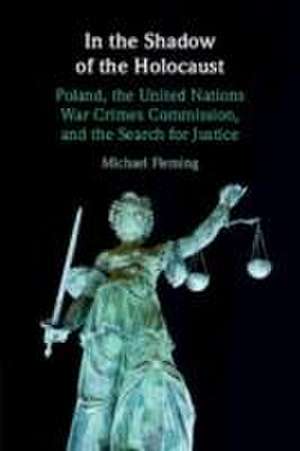In the Shadow of the Holocaust
Autor Michael Flemingen Limba Engleză Paperback – 2 noi 2023
| Toate formatele și edițiile | Preț | Express |
|---|---|---|
| Paperback (1) | 177.82 lei 3-5 săpt. | +16.56 lei 6-12 zile |
| Cambridge University Press – 2 noi 2023 | 177.82 lei 3-5 săpt. | +16.56 lei 6-12 zile |
| Hardback (1) | 575.41 lei 6-8 săpt. | |
| Cambridge University Press – 5 ian 2022 | 575.41 lei 6-8 săpt. |
Preț: 177.82 lei
Nou
Puncte Express: 267
Preț estimativ în valută:
34.05€ • 35.12$ • 28.22£
34.05€ • 35.12$ • 28.22£
Carte disponibilă
Livrare economică 30 ianuarie-13 februarie
Livrare express 15-21 ianuarie pentru 26.55 lei
Preluare comenzi: 021 569.72.76
Specificații
ISBN-13: 9781009107167
ISBN-10: 100910716X
Pagini: 318
Ilustrații: Worked examples or Exercises
Dimensiuni: 152 x 229 x 17 mm
Greutate: 0.43 kg
Ediția:Nouă
Editura: Cambridge University Press
ISBN-10: 100910716X
Pagini: 318
Ilustrații: Worked examples or Exercises
Dimensiuni: 152 x 229 x 17 mm
Greutate: 0.43 kg
Ediția:Nouă
Editura: Cambridge University Press
Notă biografică
Michael Fleming is a historian based in London. His publications include Communism, Nationalism and Ethnicity in Poland, 1944-1950 (2010), Auschwitz, the Allies and Censorship of the Holocaust (2014) and, as editor, Essays Commemorating Szmul Zygielbojm (2018). He is a recipient of the Kulczycki Book Prize for Polish Studies, and the Aquila Polonica Prize.
Cuprins
Introduction; 1. Invasion and occupation: (officially) informing the world; 2. Seeking a response: Polish diplomacy (sensu stricto); 3. Polish soft diplomacy: attempts to shape the discursive environment; 4. War crimes and the path towards the UNWCC; 5. The UNWCC, law and inter-allied politics; 6. The Polish Government in Exile's war crimes office; 7. Pursuing justice across the Iron Curtain; 8. Poland, the UNWCC and the Cold War; Conclusion.
Recenzii
'At a time when the Polish government seems intent on seizing the property of long-dead Jews, Michael Fleming's book provides vital fresh insights - challenging the idea of universal hostility of Christian Poles for the Jewish countryfolk. Using long secret archives of Polish efforts to get Nazis into court for the Holocaust, Fleming has constructed a factual account as gripping as any from Ian Fleming, his spy-fiction writing namesake.' Dan Plesch, author of Human Rights After Hitler
'This pathbreaking book sheds important new light on post-war attempts to prosecute Nazi war criminals and collaborators through an analysis of the participation in the United Nations' War Crimes Commission of representatives of the Polish government, first that established in the west after the Polish defeat and then by the pro-communist government established by the Soviets. It is essential reading for all those interested in the problem of how to prosecute genocide and crimes against humanity.' Antony Polonsky, Emeritus Professor of Holocaust Studies, Brandeis University
'Of the forty-seven members of my immediate family, only three women and I survived the Holocaust. I read Michael Fleming's new work first and foremost as a historian, but I cannot completely free myself from emotion. Information about the fate of hundreds of thousands of families like mine reached Western public opinion during the war with difficulty, with resistance and… with brakes. Michael Fleming wrote about this in his excellent work Auschwitz, the Allies and Censorship of the Holocaust. In the latest book, we have a kind of follow-up: how a “minor” Ally, but the first to offer armed resistance to German fascism - Poland - tried to sensitise the Allies to the problem of criminal responsibility for the crime of genocide and the Holocaust. And it is no coincidence that this “minor” Ally produced outstanding lawyers who had something new to say in this area. Michael Fleming's In the Shadow of the Holocaust is not only an insightful study of the past, it is also a warning against - God forbid - a repetition in the future.' Marian Turski, President of the International Auschwitz Committee
'This pathbreaking book sheds important new light on post-war attempts to prosecute Nazi war criminals and collaborators through an analysis of the participation in the United Nations' War Crimes Commission of representatives of the Polish government, first that established in the west after the Polish defeat and then by the pro-communist government established by the Soviets. It is essential reading for all those interested in the problem of how to prosecute genocide and crimes against humanity.' Antony Polonsky, Emeritus Professor of Holocaust Studies, Brandeis University
'Of the forty-seven members of my immediate family, only three women and I survived the Holocaust. I read Michael Fleming's new work first and foremost as a historian, but I cannot completely free myself from emotion. Information about the fate of hundreds of thousands of families like mine reached Western public opinion during the war with difficulty, with resistance and… with brakes. Michael Fleming wrote about this in his excellent work Auschwitz, the Allies and Censorship of the Holocaust. In the latest book, we have a kind of follow-up: how a “minor” Ally, but the first to offer armed resistance to German fascism - Poland - tried to sensitise the Allies to the problem of criminal responsibility for the crime of genocide and the Holocaust. And it is no coincidence that this “minor” Ally produced outstanding lawyers who had something new to say in this area. Michael Fleming's In the Shadow of the Holocaust is not only an insightful study of the past, it is also a warning against - God forbid - a repetition in the future.' Marian Turski, President of the International Auschwitz Committee
